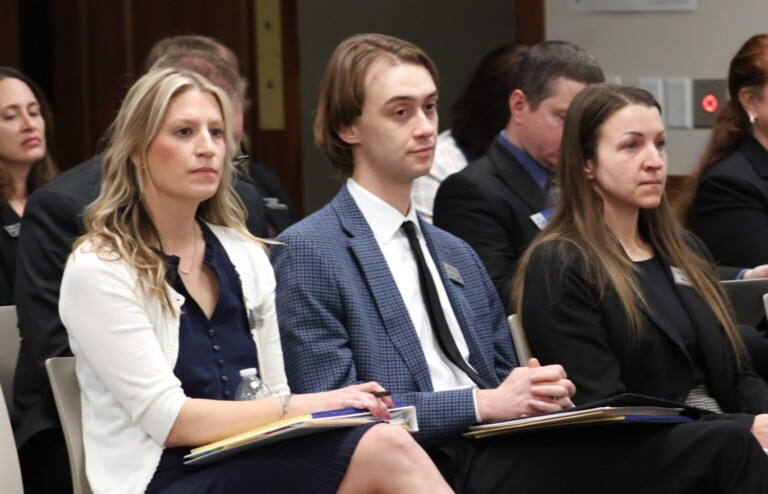Ethics Commission highlights time management in annual report

BISMARCK, N.D. (North Dakota Monitor) — A new report shows that Ethics Commission complaints that don’t require a full investigation are usually closed in fewer than six months.
The commission was directed by the 2025 Legislature to compile annual reports to help the public understand how it operates — especially in light of ongoing concerns from state officials that the agency takes too long to resolve baseless allegations.
The first-of-its-kind document released Friday highlights the commission’s work since its inception in 2019, with a special focus on the fiscal year that began on July 1, 2024, and ended June 30, 2025.
Over the last six years, the commission has received a total of 158 complaints. Of those, 106 have been closed, the report states.
It says most complaints were dismissed without requiring an official investigation.
The report indicates that these complaints have typically been tossed out in a matter of months. The quickest to be dismissed were those identified as falling outside the commission’s jurisdiction. In this scenario, the commission concludes that the individual accused of unethical behavior and/or the alleged wrongdoing is not subject to the board’s regulatory authority.
Complaints thrown out for lack of jurisdiction were typically closed within 29 days, the report states. Ethics Commission Executive Director Rebecca Binstock noted in a Wednesday meeting that the reason such complaints aren’t resolved sooner is because a vote by the commission — which meets once a month — is required for them to be dismissed.
Other complaints required a preliminary review before the commission determined they should be tossed. These complaints took an average of 68 days to be closed, according to the report.
Before complaints get to the investigation stage, state law allows the person who filed the allegation to try to arrive at an informal settlement with the accused. The annual report indicates that to date, this has not been an effective method of addressing complaints. As of the report’s publication, only two complaints had been resolved this way. They took an average of 98 days to close.
One of those two informal resolutions, which was disclosed last summer, required the North Dakota School Boards Association to no longer partner with the international exchange program Global Bridges. The content of the complaint was not made public. Former Sen. Ray Holmberg, who was sentenced to 10 years in prison earlier this year for a sex crime related to traveling to the Czech Republic, went on several state-subsidized trips to Europe through Global Bridges.
The Legislature this year amended state law to allow the Ethics Commission to negotiate informal settlements directly with the accused.
According to the report, the time it took the commission to dismiss complaints at the initial review stage varied widely from year to year. The shortest average time was eight days in 2021, though this was before the commission experienced a large uptick in complaint filings in 2022. The longest average times were 154 days in 2023 and 153 days in 2024.
So far in 2025, it has taken an average of 43 days for complaints to be dismissed at the initial review, the report indicates.
Between Jan. 1 and June 30, there were 74 complaints filed with the commission — more than any other year. A total of 52 complaints were pending.
The report also includes three policy recommendations that the commission believes will make the state government more transparent:
- Requiring registered lobbyists to provide email addresses to help the Ethics Commission better communicate with them
- Requiring state leases to be subject to a competitive bidding process
- Improving the commission’s rule-making process to provide “ample opportunity for interactive discussion and revision prior to final adoption”
Binstock said the commission would like to have a more rigorous public comment process — like hosting multiple public hearings in multiple locations, for example — but it’s unclear if state law allows this.
Accomplishments highlighted by the commission in the report include:
- Resolving eight complaints involving Rep. Jason Dockter, finding the lawmaker had committed three ethics violations related to a conflict of interest
- Issuing eight advisory opinions as of June 30 giving officials guidance on ethical gray areas
- Putting on dozens of educational workshops and presentations that reached an estimated audience of more than 1,000 people
The Ethics Commission was established in 2018 by a voter-initiated amendment to the state constitution. It’s tasked with promoting ethical behavior in the areas of elections, transparency, corruption and lobbying.
During the 2025 Legislative session, some lawmakers voiced concerns that they believe the Ethics Commission is being weaponized by people who lodge frivolous complaints against their political opponents.
Rep. Mike Nathe, R-Bismarck, supported an amendment that would have forced the commission to dismiss complaints not resolved after 180 days. He noted some complaints have taken more than two years to address. The amendment ultimately failed.
“It’s just a matter of fairness to the accused,” Nathe said previously. “They shouldn’t have to sit there with this hanging over their head for years at a time.”
North Dakota Monitor reporter Mary Steurer can be reached at msteurer@northdakotamonitor.com.






